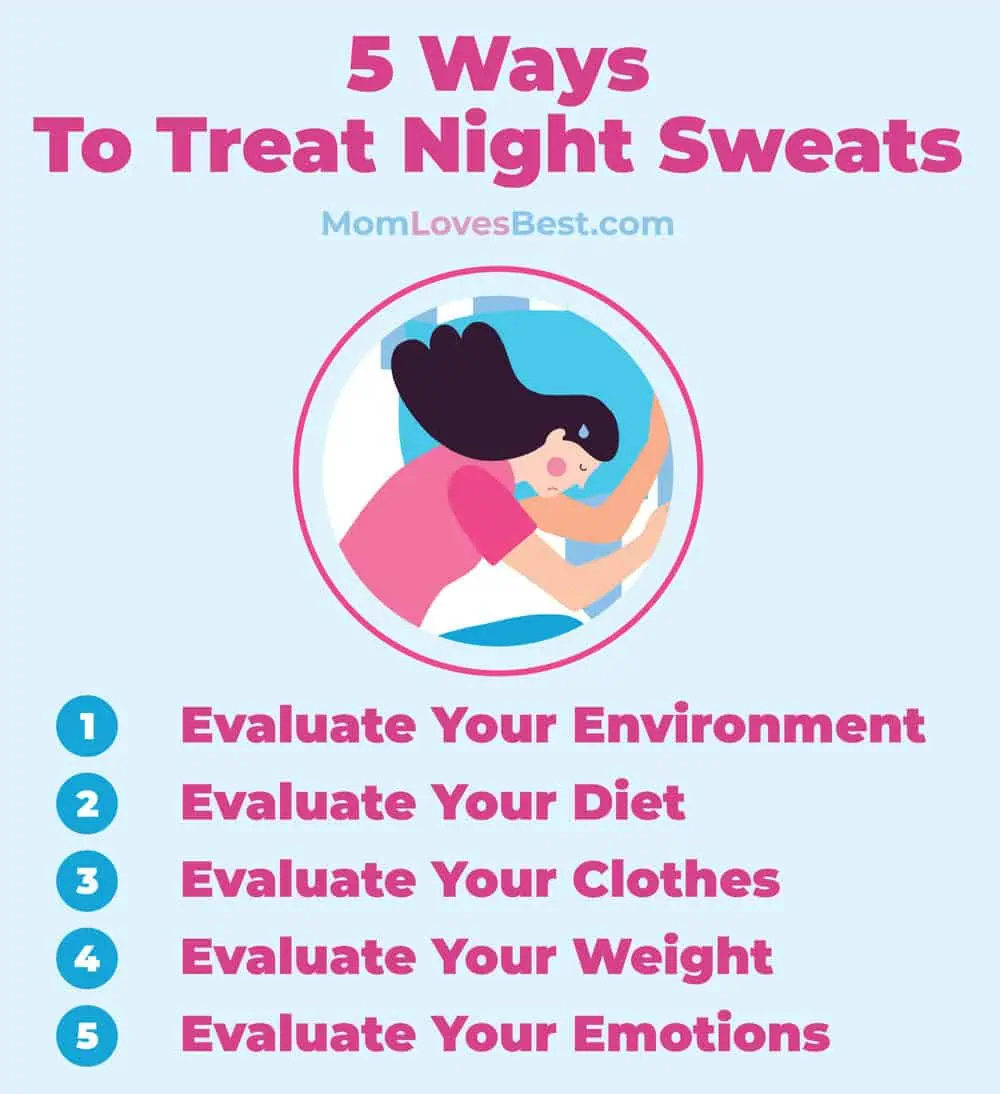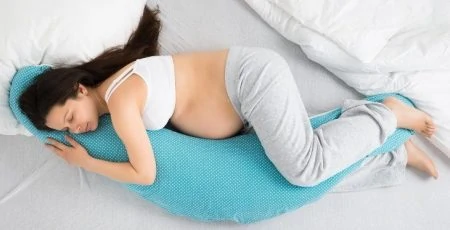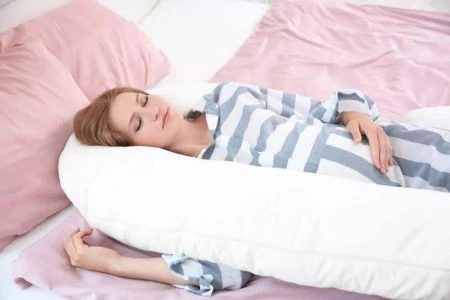Have you been waking up in the middle of the night soaked in sweat during your pregnancy?
Sleeping through the night is hard enough when you’re expecting, but many women find themselves at the mercy of intense sweating that only makes things worse. This can be especially frustrating because getting a healthy night of sleep is essential for any mom.
We’ve experienced pregnancy night sweats many times and understand the frustration — and we want to help.
With the guidance of our medical team, we’ve thoroughly researched this subject and will explain what causes night sweats during pregnancy and what you can do about them. We’ll even provide some tips for getting back to sleep after waking.
Key Takeaways
- Night sweats during pregnancy, also known as nocturnal hyperhidrosis, are caused by hormonal changes and are common in the first and third trimesters.
- To minimize night sweats, keep your environment cool, wear light clothing, and avoid spicy, caffeinated, and sugary foods before bed.
- If night sweats persist after pregnancy or occur when not pregnant, consult a doctor, as they may be a sign of an underlying condition.
- To manage night sweats, prepare by having a change of clothes, water, and a towel nearby, and establish a calming routine to help you fall back asleep.
What Are Night Sweats?
Nocturnal hyperhidrosis, or night sweats, refers to an excess of perspiration some women experience during pregnancy while they sleep.
To have night sweats does not simply mean you feel hotter at night or sweat more than you usually would — it means you sweat excessively.
If you’re experiencing night sweats, you’ll likely sweat through your clothing. Most pregnant women with nocturnal hyperhidrosis find they can’t sleep through the night because their bedding becomes soaked.
Nausea and headaches are other symptoms commonly linked with night sweats.
What Causes Pregnancy Night Sweats?
Your brain controls your body temperature. When your body becomes too hot, a part of your brain called the hypothalamus goes to work, causing your body to produce sweat. As sweat evaporates on your skin, you cool down.
It’s not that you’re superheated when you’re pregnant — so what’s causing the hypothalamus to turn up your body’s air conditioning?
During pregnancy, your hormones change at a rapid pace. When your estrogen drops, the hypothalamus believes you’re too hot and sends signals to your body to start sweating. Because the hypothalamus also controls sleep, this sweating generally occurs at night.
The Trimesters and Night Sweats
According to the general ebb and flow of hormones, you have a higher chance of experiencing night sweats during your first and third trimesters. Your body experiences the most hormonal fluctuations during this time (1).
Your second trimester should be smooth sailing, and most women find their hormones start to return to their normal levels approximately a month after giving birth.
However, every woman is different, and your experience with night sweats may be unique. You should always talk to your doctor if you have questions or concerns.
Other Causes for Night Sweats
During pregnancy, nights sweats are relatively common and do not indicate any serious illness. You may even experience night sweats in the early postpartum period. It’s one of the ways that your body gets rid of the extra fluid you carried during pregnancy.
However, if you are experiencing night sweats and you are not pregnant, or if it has been a significant amount of time since you have given birth, talk with your doctor.
Night sweats have been linked to certain disorders, medications, and even cancer. Your doctor can ensure your night sweats are not being caused by something more serious.
Many women also get night sweats during menopause as their estrogen levels drop.
5 Ways To Treat Night Sweats
You’ve probably realized that controlling your hormones is impossible during pregnancy. Unfortunately, this means it’s also impossible to avoid night sweats completely.
However, there are things you can do to minimize the chances of night sweats happening to you and make excessive sweating bearable.
Here are five things to keep in mind if you are suffering from night sweats:
1. Evaluate Your Environment
First and foremost, keep your environment cool. Run the air conditioner at night or invest in some extra fans.
Then, take a look at your bedding. Do you have lots of blankets? Remove as many extra layers as you can. Make sure you use bedding made with light, breathable fabrics, such as cotton. Avoid synthetic fabrics and comforters with heavy batting.
2. Evaluate Your Diet
Spicy, acidic foods do not just feel hot on your tongue. They can trigger a higher body temperature and night sweats.
Do your best to avoid (2):
- Caffeinated drinks.
- Coffee.
- Spicy foods.
- High-fat foods.
- Sugary foods.
You also want to avoid eating or drinking approximately two to three hours before you go to bed.
Watery Wisdom
3. Evaluate Your Clothes
What do you wear to bed? If you’re experiencing night sweats, you should keep your layers to a minimum, and stick to light, natural fabrics.
Another option? Try athletic wear. While synthetic fabrics are usually a big no-no, many pieces of athletic wear wick away moisture from the body. Just make sure they are not too tight and restrictive.
4. Evaluate Your Weight
Some weight gain can contribute to rising body temperatures. Discuss with your doctor what a healthy pregnancy weight looks like for you. Exercise when possible, but avoid doing so right before bed or during the hottest parts of the day.
Stay Cool In The Pool
5. Evaluate Your Emotions
There’s a reason intense emotions such as anger are described as making you “hot-headed.” They can actually raise your body temperature. Try to reduce stress and anxiety in your life, as this can help relieve night sweats and improve your overall health.
We found that having a solid bedtime routine helped calm us down. It especially helped if we put down the phone or other electronic devices at least thirty minutes before bed.
These are some things we found helpful for producing a calmer mental state before sleeping:
- Meditation.
- Journaling.
- Reading a book or magazine.
- Talking with a partner.
- Gentle yoga poses.
How To Go Back to Sleep After Night Sweats
These tips will help you get back to sleep with ease after waking in the night, soaked in sweat.
1. Be Prepared
Keep a few essentials nearby to avoid fumbling in the wee hours of the morning. These items might include a change of clothes, a bottle of water, a small fan, and a towel. When you wake up, wipe yourself off and drink some water.
2. Make a Change
It’s not always easy to change the sheets and bedding at night. If you don’t have time or energy, lay a large, comfortable towel over the bed to sleep on. Then, place a new sheet or lightweight blanket on top of you. You can handle the sheets in the morning!
3. Relax
The most important thing to do is relax so you can get back to sleep. You may feel embarrassed, frustrated, and exhausted, but this isn’t your fault, and it’s perfectly natural.
Take some stress away by setting up a “falling back asleep” routine. Listen to soothing sounds, sip on some water, or take deep breaths.
You may want to listen to positive birth mantras to help you fall asleep. These mantras will help you maintain a positive attitude. And by training your brain to relax to it, these same tracks will soothe you in labor!
Editor's Note:
Caitlin Goodwin, MSN, RN, CNMWhat To Buy for Night Sweats
We found the following products to be especially helpful for night sweats during pregnancy.
1. Cooling Pillow Mats
Slip one of these underneath your pillow to help easily disperse body heat. Some cooling mats also double as ice or heating packs.
2. Moisture-Wicking Sheets
Much like athletic gear, moisture-wicking sheets are designed to draw sweat away from the body, keeping your skin dry.
3. Bed Cooling Systems
Although on the more expensive side for night sweat solutions, we love how a bed cooling system can keep you cool while allowing your partner to stay warm on their side.














